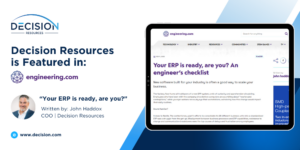Pros and Cons of Choosing Between Native ERP Extensions and Third-Party Solutions

Article Author: Tim McManus
Navigating ERP extensions can be a lot like navigating a crowded mall on Christmas Eve. It’s easy to get overwhelmed with options and bombarded by salespeople, making it difficult to make the right decision. Much like shopping for the right gift for a friend or loved one, when it comes to ERP add-on solutions it’s best to take a step back to identify your requirements, make a good list of options, and do your research before hitting the store so you have a good sense of what’s available, what products are the best fit, and how much it will cost you.
The question of the day becomes, how do you choose between native platform extensions and integrating a third-party solution?
Businesses in manufacturing and distribution rely heavily on their Enterprise Resource Planning (ERP) system to run their day-to-day operations. We know that with the right tools in place, efficiency, security, and productivity increase significantly year on year. We also know the opposite is true. When companies fail to invest in maintaining or optimizing their internal platforms and tools, we see slower year on year growth and most often a loss of productivity or profitability over time.
Today’s ERP software is not the software of 20 years ago; the same as your iPhone is not the same as the phone you used 20 years ago. Technology has evolved exponentially and continues to do so with each release. While many top-tier ERP platforms offer a robust suite of core functionalities, they often fall short in offering specialized solutions that meet a complex business challenge or industry requirement. Some common areas where an ERP falls short are Shipping and Transportation, Warehouse Management Systems (WMS), Quality Control, and others.
These gaps leave your business with a choice to make. Do I build a customization, purchase an off-the-shelf native extension, or do I integrate a third-party tool or solution? In our experience building a customization is rapidly becoming the least popular option due to time, complexity, cost, and compatibility maintenance over time. This article zooms in on the pros and cons of purchasing a native platform extension vs integrating a third-party solution, offers considerations for making an informed decision, and outlines a decision-making framework to guide your business through this critical process.
Native Platform Extensions
These are third-party applications built using the same platform and programming language as your existing ERP system. They are designed to integrate seamlessly, appearing as part of (or an extension of) your current ERP. This native integration often provides a unified user experience, simplifies data management, and can offer a more seamless experience when it comes to keeping up with the latest ERP releases or updates.
Integrated Third-Party Solutions
These are standalone third-party applications developed independently of your ERP’s platform. They connect to your ERP through integration touchpoints or Application Programming Interfaces (APIs). While they operate outside the ERP, they interact with it to exchange data and synchronize processes. These solutions often fill a gap or void within the ERP that would typically require advanced customization or programming to meet the specific needs of your business.
Native Platform Extensions
Pros
- Seamless Integration – Native platform solutions are inherently compatible with your ERP system. This compatibility ensures that data flows smoothly between modules without the need for complex middleware or custom integration work.
- Unified User Experience – Users can navigate through the ERP and the extended functionalities without switching interfaces. This consistency reduces the learning curve and enhances productivity.
- Simplified Maintenance and Updates – Since both the ERP and the extension share the same platform, updates and maintenance can be more straightforward. Compatibility issues are less likely, and vendor support is typically more cohesive.
- Consistent Data Model – Sharing the same data structures minimizes the risk of data discrepancies. Real-time data access across modules ensures that all departments work with the most current information.
- Potentially Better Performance – Native solutions can offer better performance because they are optimized for the ERP’s platform. They can leverage the ERP’s internal resources more efficiently.
Cons
- Limited Specialized Features – Native solutions may not offer the depth of functionality found in best-of-breed applications. They might provide basic features but lack advanced capabilities that specialized vendors offer.
- Vendor Lock-In – Relying heavily on a single platform can make it challenging to switch vendors or platforms in the future. This dependency might limit flexibility and bargaining power.
- Innovation Lag – Third-party developers focusing on native platforms may not innovate as rapidly as independent software vendors specializing in a particular domain.
Pros and Cons of Integrated Third-Party Solutions
Pros
- Best-of-Breed Functionality – These solutions are developed by companies focusing on a specific area. They can sometimes offer advanced features, customization options, and innovative tools that surpass native extensions.
- Flexibility and Choice – Businesses can select solutions that precisely meet their needs, mixing and matching from various vendors to build an optimal tech stack.
- Potential Cost Savings – Competitive pricing among independent vendors can lead to cost savings.
- Rapid Innovation – Specialized vendors may introduce new features and improvements more frequently, keeping you at the forefront of industry developments.
Cons
- Integration Complexity – Connecting separate systems can be challenging. It may require significant IT expertise to ensure seamless data flow and process alignment.
- Data Synchronization Issues – Without proper integration, there’s a risk of data inconsistencies, leading to errors and inefficiencies.
- Increased Maintenance Overhead – Managing multiple vendors and systems can strain IT resources. Updates, patches, and compatibility checks become more complex.
- Inconsistent User Experience – Different interfaces and user experiences can confuse users, potentially reducing productivity and increasing training costs.
- Performance Concerns – Data exchange between systems can introduce latency, affecting real-time operations and decision-making.
Considerations for Making the Right Decision
Business Requirements
- Specialization Needs: If your business requires advanced features in specific business areas, a best-of-breed solution might be necessary.
- Process Complexity: Complex operations may benefit from specialized tools that can handle nuanced workflows.
Technical Infrastructure
- Integration Capabilities: Assess your ERP’s ability to integrate with external systems. Modern ERPs often have robust APIs that facilitate integration.
- IT Resources and Expertise: Consider whether your IT team has the skills to manage integrations or whether you’ll need external support.
Costs
- Upfront Costs: Evaluate the initial investment required for both options, including licensing fees and implementation costs.
- Ongoing Maintenance: Factor in the costs associated with updates, support, and potential integration troubleshooting.
Vendor Support and Relationships
- Reliability: Research vendor reputations for support and reliability. References are a key part of this evaluation.
- Partnerships: Strong vendor relationships can enhance support and collaboration.
Scalability and Future Growth
- Growth Plans: Choose a solution that can scale with your business.
- Flexibility: Ensure that the system can adapt to future technological advancements or changes in business processes.
Risk Management
- Data Security: Evaluate the security measures of both options, especially concerning data exchange in integration-based solutions.
- Downtime and Reliability: Consider the potential impact of system failures on your operations.
Choosing between native platform extensions and separate, integration-based solutions is a significant decision that can shape the efficiency and growth trajectory of your manufacturing or distribution business. Native solutions offer seamless integration and a unified user experience, simplifying maintenance and ensuring consistent data flow. However, they may fall short in providing specialized features and rapid innovation. On the other hand, integration-based solutions deliver best-of-breed functionality and greater flexibility but come with challenges like integration complexity and potential data inconsistencies.
Ultimately, the right choice hinges on a careful assessment of your specific business needs, technical capabilities, and long-term goals. Consider the complexity of your processes, the expertise of your IT team, cost implications, vendor reliability, and the scalability of the solutions. By thoughtfully evaluating these factors, you can make an informed business decision that not only addresses current operational gaps but also positions your company for future success. Remember, the goal is to enhance your ERP system in a way that supports your business’s unique requirements while fostering growth and adaptability in an ever-evolving industry landscape.
More About the Author: Tim McManus
With over 35 years of experience in the ERP sector working with Infor CloudSuite Industrial (SyteLine) ERP and advanced shipping automation solutions, Tim has become a valuable and trusted asset to our Manufacturing and Distribution clients at Decision Resources.
As a dedicated product expert and thought-leader, Tim is passionate about helping American manufacturers make informed business decisions and fuel growth initiatives through ERP, tools, processes, and solutions.
How Decision Resources Can Help
Decision Resources has been implementing ERP systems and efficient data processes for over 40 years. We specialize in ERP implementations for growing manufacturers, and we are well-versed in the data needs, challenges, and requirements needed to thrive in today’s manufacturing environment. To explore a modern ERP for your business contact us at, 412-562-9660 or email info@decision.com. We look forward to partnering with you!
Similar Blogs

How Steel Manufacturers Forge Ahead with Infor CloudSuite Industrial ERP

Using Cloud ERP to Navigate Economic Uncertainty in The Discrete Manufacturing Sector





